MESSAGE FROM THE PRESIDENT
(Please read below or download the PDF version by clicking here.)
A concept I use extensively in my teaching and peacebuilding work is that of peace as a “process-structure”. I learned about this through the work of peacebuilding theorist and practitioner, John-Paul Lederach, who drew on ideas from quantum physics to develop this concept. For Lederach, peace is neither just an endless dynamic process nor a fixed end-state; it is both.  He uses the metaphor of a river to illustrate this. When you stand knee-deep in a flowing river, you see, feel and hear dynamic movement of the water. However, if you view the river from the top of a mountain or an airplane, it appears as a static shape.
He uses the metaphor of a river to illustrate this. When you stand knee-deep in a flowing river, you see, feel and hear dynamic movement of the water. However, if you view the river from the top of a mountain or an airplane, it appears as a static shape.
Being involved in the day to day work of InterChange is like being in the swiftly flowing river or perhaps a whirlwind: busy, exciting, and often taking us in directions we hadn’t expected. However, at the time of our Annual General Meeting, when we look back to take stock of what we’ve done over the past year, the big picture of the “structure” side of the concept emerges.
The big picture, the main focus of our work over the year has been peace literacy—the idea that peace is not an abstract, unattainable dream, but rather a way of looking at the world involving values, attitudes, concepts and skills that can be learned and put into practice. We’ve promoted this idea within our organization and taken out into our communities, guided always by the notion that “Everybody can be a peacebuilder”.
In looking back over the year, we find that this work is foundational to the vision and mission of InterChange, and that this focus has helped us define our niche. It has also given us a solid base on which to build, and we have defined this as the direction we want to take in our Strategic Plan.
Another highlight of the year is the further development of our website especially with the expansion into exciting new areas such as the intersection of Food and Peace, and where Health and Peace meet. Over the year, we produced a newsletter focused on the theme, “Everyone can be a Peacebuilder” and our Facebook page has been very active. We’ve also produced attractive InterChange promotional brochures, a series of educational postcards, and an InterChange banner, which was unveiled for the first time at our 2012 AGM!
I’ve also been most encouraged by the dedicated hard work of our members around the world and by the new people who have come into the InterChange family over the year. I look forward to the future development of InterChange with excitement and enthusiasm.
Anne Goodman, President
2011 ANNUAL GENERAL MEETING (AGM)
InterChange’s AGM was held on June 11, 2011 in a unique bookstore/community space in Toronto, Canada, called Accents on Eglinton. As is our usual practice, the AGM was followed by an event of interest to both people in InterChange and the wider public. The 2011 event focused on our project, 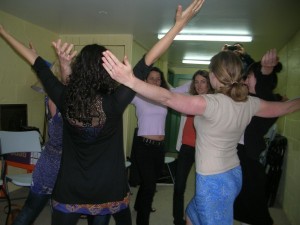 “Building a Culture of Peace in Toronto,” and we used a strength-based, Appreciative Inquiry approach to look at what we had achieved to date with the project and where we wanted to go in the future. The approach used 4 D’s:
“Building a Culture of Peace in Toronto,” and we used a strength-based, Appreciative Inquiry approach to look at what we had achieved to date with the project and where we wanted to go in the future. The approach used 4 D’s:
- Discovery (Appreciate what is)
- Dream (Imagine what might be)
- Design (Determine what should be)
- Destiny (Create what will be)
The workshop made a significant contribution to our focus on peace literacy and the “Everyone can be a peacebuilder” theme that emerged over the past year.
2011/12 INTERCHANGE BOARD
InterChange Board members worked hard over the past year, taking on responsibility for committees, various areas of governance, and local centre activities. The Board consisted of the following:
Anne Goodman (President) – Toronto, Canada
Ezra Houser – Toronto, Canada
Tor Iorapuu- Jos, Nigeria
Issa Kirarira- Kampala, Uganda
David Macharia- Nairobi, Kenya
Erin Scuccimarri- Toronto, Ontario
Charles Tauber- Vukovar, Croatia
Carolyn Webb (Secretary) – Ottawa, Canada
Michael Wheeler (Treasurer) – Toronto, Canada
Ezra Houser, Issa Kirarira, and David Macharia, and Erin Scuccimarri have decided not to run again for the 2012-13 term. We would like to sincerely thank them for their contribution to InterChange during their term on the Board and we look forward to working with them in other capacities.
EDUCATION AND PROJECTS
InterChange projects fundamentally define and solidify the organization and its work. Projects are multi-dimensional in that they integrate with all other aspects of the organization’s work including action, community building and relationship building. Projects provide opportunities for members to be involved in the organization’s activities.
Projects also contribute to InterChange’s identity as an organization that is both international and intensely local. Projects are international in scope but are rooted at the local level, taking their shape from and contributing to the local context. Project themes emerge from the interests of members and have the capacity to link and engage members from around the world.
The aim of InterChange’s educational work is to provide basic knowledge, skills, and attitudes to a number of groups in the context of the theme Everyone Can Be a Peacebuilder. This work is targeted at trainers of trainers, peacebuilders, and the public. InterChange’s public education efforts aim to transform societal ideas on peacebuilding and to build general consciousness of peacebuilding at the grassroots.
Building a Culture of Peace in the GTA: This is an exciting education and training programme that was initiated in September 2010 with the support of the Catherine Donnelly foundation. The funding was for one year, and allowed us to employ our first full-time employee. We have worked to make the project sustainable and ongoing by using an earned revenue model whereby a portion of course fees goes to the facilitators and a percentage is retained by InterChange. This has allowed us to retain a part-time staff person. We are also seeking donations specifically for this project and will pursue further grants in the future.
The project connects facilitators able to offer peace-building workshops with leaders and members of communities who want to foster a culture of peace in the Greater Toronto Area, Canada. The programme targets, amongst others, communities facing ongoing cycles of violence due to historic and current traumas, and systemic injustice. These include diaspora communities from conflict zones, women and youth.
Highlights of the project include:
- Developing a foundational workshop, Everyone can be a Peacebuilder, using the metaphor of a picnic to explore participants’ unique peacebuilding roles
- Creating a series of peace postcards and other materials that have great utility for education about peace
- Continuing our workshop series entitled Peace begins at Home in 2 Toronto-area high schools
- Piloting a 4-module workshop series at Centennial College
- Providing a number of workshops in the community, including with the Rexdale Women’s Centre and the Toronto Crisis Response team
- Offering meaningful opportunities for volunteers, interns and practicum students to be involved.
Toolkit for peacebuilders:This project was initiated at the InterChange symposium in Rwanda in 2005 but received new energy and far better definition during the Facilitators’ Workshop in Kenya at the end of 2010.
InterChange is developing a toolkit that will compile and share peacebuilding models, tools and ideas that its members have found useful. Each tool will provide information about: who has used the tool; where it can be obtained; in what situation people have found it useful; how it was used; and where it may not be suitable / advisable to use. The intention is not to create an exhaustive list of resources but rather one that has been peer reviewed and recommended. A template has been developed for collecting resources for the toolkit. The toolkit will be made available to InterChange members through the organization’s website.
Food/Peace project: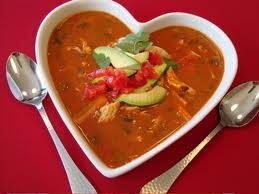 This is a long-term InterChange project that recently became an ongoing column on our website, due to the efforts of InterChange volunteer, Rebecca Ballen. Food is universal, and every culture has stories of how food is connected to peace and conflict. Because identity and cultural issues play such a big part in violent conflicts today, the symbolic value of food in peacebuilding can be enormous.
This is a long-term InterChange project that recently became an ongoing column on our website, due to the efforts of InterChange volunteer, Rebecca Ballen. Food is universal, and every culture has stories of how food is connected to peace and conflict. Because identity and cultural issues play such a big part in violent conflicts today, the symbolic value of food in peacebuilding can be enormous.
InterChange is collecting and sharing experiences about how food and drink are used to build peace in our communities, with an online column of stories, recipes, pictures, songs, poems and snippets of information. Rebecca uses the metaphor of the Eastern European folk tale “Stone Soup,” to describe this project. Just as all the villagers in the story contributed food items to create a delicious soup, creating and sharing an ongoing Food and Peace column together is part of building peace.
COMMUNICATION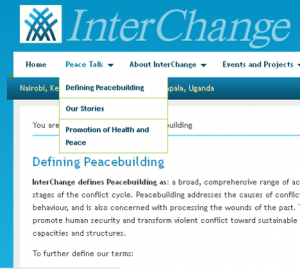
Our website: The past year has seen a marked development and expansion of our website. We initiated a section called Peace Talk, which broadly explores the many different ways we understand and experience peace in our lives. This section has a number of components, including our definitions of peace and peacebuilding, our stories from around the world, the column on Food and Peace discussed above, and a new focal area on Peace and Health, initiated by Anthea Darychuk. Anthea describes peace and health as mutually reinforcing concepts, and suggests we cannot have one without the other. In all of these areas, we are encouraging InterChange members to send their stories, ideas and resources.
Other features of our website include: a number of photo galleries, updates and information on our projects, and regular President’s messages.
In the future, we’d like to generate regular blog posts on practical and theoretical aspects of peacebuilding. We also plan to further develop the interactive nature of the website.
Member’s only website: We have developed the technology for a members-only section of the website and will be using it to post the Toolkit for Peacebuilders, amongst other information.
Newsletter: A second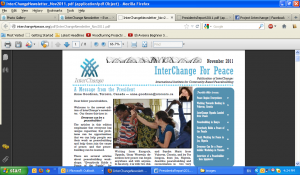 editionof the InterChange newsletter has been produced on the theme of “Everyone can be a Peacebuilder’.
editionof the InterChange newsletter has been produced on the theme of “Everyone can be a Peacebuilder’.
Social media: We also have an active Facebook page and plan to initiate a Twitter presence.
Other communications: 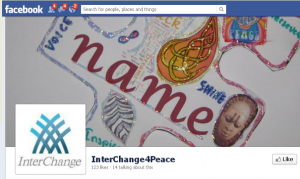 Because we are an organization based on relationships and because of the geographical distances that separate us, communication technology is very important. We will continue to search for and develop technologies that allow our board to function well across distance and to allow real communication among our members and local groups around the world.
Because we are an organization based on relationships and because of the geographical distances that separate us, communication technology is very important. We will continue to search for and develop technologies that allow our board to function well across distance and to allow real communication among our members and local groups around the world.
We are also hoping to create opportunities for members from different centres around the world to get together in person. One such opportunity is the 20th anniversary of the Transformative Learning Centre, the university host of InterChange, in 2013. We also encourage InterChange student members to do internships and independent study in InterChange centres in other parts of the world when possible.
INTERCHANGE LOCAL CENTRES
InterChange is a Canadian charitable organization with members in different parts of the world. Our work is both international and local, and Local Centres bring InterChange’s work to the local level. We seek to establish local centres where there is a concentration of InterChange members, recognizing that the form and composition of the centres may differ from place to place.
InterChange Kenya Local Centre
The context of the work is the approaching elections which will be held in 2013. After the 2007/8 post-election violence, there have been many state level responses, including the August 2010 referendum and the establishment of the Kenyan Truth Justice and Reconciliation Commission, and the International Criminal Court indictment of Kenyans responsible for the 2007/8 post election chaos.
After InterChange’s very successful Facilitators’ Workshop held in Nairobi at the end of 2010, members in Kenya have been working on community-level training workshops and discussion forums. The work has been focussed on reconciliation and healing after the post-election violence of 2007/8, as well as preventing violence in the upcoming election.
Communities across the country have reflected on the following questions:
- What were the causes of the post election violence 07/8?
- Is it possible for the reoccurrence of the post election violence in 2012/2013?
- How to prevent the reoccurrence of the post election violence?
InterChange members in Kenya are mainly concentrated in Nairobi and in Kisumu, in western Kenya.
InterChange Uganda Local Centre
The organization promotes peace on all levels, from the individual to family to community, and branching out to the national and international levels.
The centre has been active in 3 parts of the country: Kampala, Kabale in the southwest of the country, and Lutengo, a village in the Mukono region.
The centre carries out a range of activities, including:
- Peace education in the schools
- Media and peace programs and regular peace radio broadcasts
- A program for youth , “play soccer, make peace”- played on religious holidays and UN days
- In Lutengo, with the donation of 3 laptops, the centre offers an Internet café with computer training, internet surfing, typing, scanning and counseling services, among others.
InterChange Greater Toronto Area (GTA) Local Centre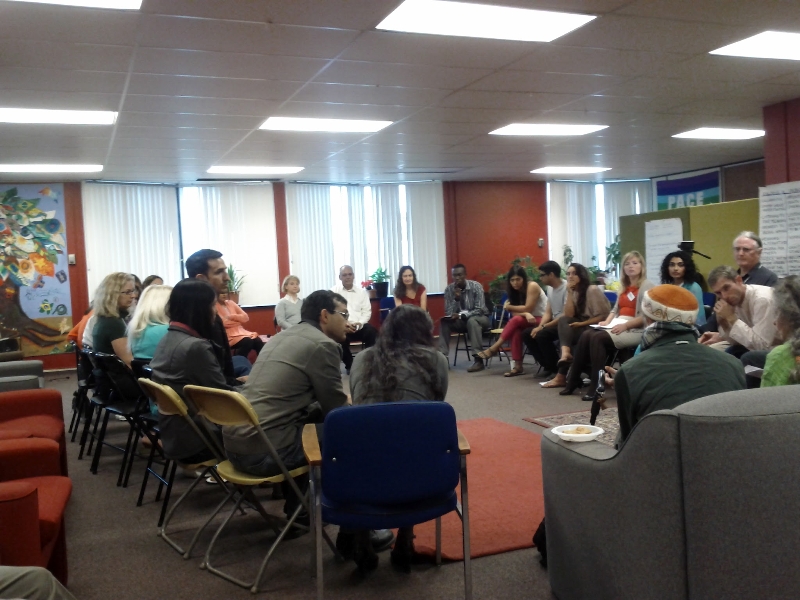
The Centre holds activities that deepen relationships between its members and programs that provide outreach and education to the broader community.
The primary focus over the past year has been the Building a Culture of Peace in the GTA project.
Teresa Holleran took on the role of Local centre coordinator. The local centre plans to host at least six events a year. Events during the past year included Meditation Monday, when people were introduced to breathing, mindfulness, and yoga in a local park, and an event following the 2011-12 AGM called Remembering Partition 1947: A Dialogue for Healing and Change. Upcoming events include a book discussion, a youth-focused event and a social event for our members.
InterChange Vukovar Local Centre
In Vukovar, Croatia, the Coalition for Work with Psychotrauma and Peace (CWWPP) serves as the local host of the Vukovar Local Centre of InterChange. InterChange Board member, Charles Tauber, notes that it is now 20 years since the Balkan wars began in 1991.
CWWPP/InterChange believes that “everyone can be a peacebuilder”. Their work includes:
- A program of sensitization/public education to get people to talk about their lives and to work together to achieve health and healing.
- Working on the Course for Workers in Areas of Regeneration (CWIAR), which includes work on communication, psychology, civil society, non-violent conflict transformation, and human rights. The idea is to give people with little or no education in these fields sufficient knowledge, skills, and attitudes to work in their communities. They are now completing the manual for the course and developing an online version of the course.
Jos, Nigeria
InterChange Board member, Tor Iorapuu, lives and works in Jos, Plateau State, an area which witnessed the centre of a great deal of Christian-Muslim violence over the past year with ever-increasing militarization, escalation of violence and police presence. As in many other areas of the world, the communities lack trust in the politicians, media and the military.
In reporting on the peacebuilding work being doe in the community, Tor remarks that “hope is not lost”. Youth, Adolescence Reflection and Action Centre (YARAC) is a youth focused group working with young people on a variety of issues and using a number of approaches, including Development Theatre and Soccer 4 Democracy. Over the past year, the group has drawn on the core lessons learnt from InterChange–dialogue and Nonviolent Communication– allowing people from different religious groups the opportunity to speak, listen and hear each other. Young people from the group have shown remarkable tolerance, maturity and solidarity, and they have been able to take their message to other youth groups in different communities. The outcomes look promising. Tor remarks that, “Moving from one community to another is our InterChange way of breaking barriers….Peace cannot be achieved at hotel conference halls but with the people sharing and empathizing with and in their contexts. “


Recent Comments